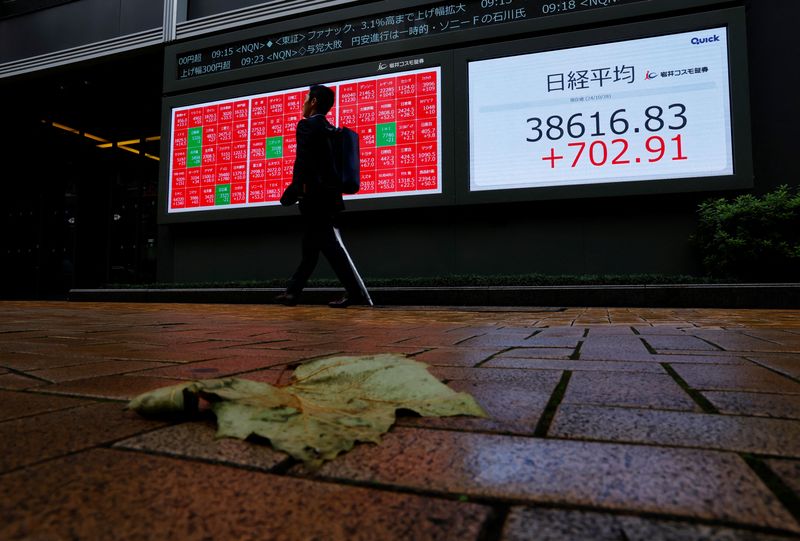By Brigid Riley and Kevin Buckland
TOKYO (Reuters) – Japanese shares rose on Monday as the yen rose to a three-month low after Prime Minister Shigeru Ishiba’s coalition lost its parliamentary majority in a drubbing in Sunday’s elections, raising uncertainty about the path ahead policy and the economy increased.
Ishiba’s Liberal Democratic Party (LDP), which has ruled Japan for almost all of its post-war history, and junior coalition partner Komeito won 215 seats in the lower house, short of the 233 needed for a majority. The LDP previously had 247 seats and Komeito 32.
The outcome could force parties into difficult power-sharing deals to govern, potentially leading to political instability.
The stock average ended the day up 1.82% to 38,605.53, after rising as much as 2.2%. The opening was 0.4% lower.
The yen accelerated its decline during the morning session, falling to 153.885 per dollar for the first time since July 31. The yen settled about 0.8% lower at 153.505 per dollar as of 0600 GMT.
“The outcome of the election itself is undoubtedly negative for the stock market, due to increasing political uncertainty,” said Masahiro Ichikawa, chief market strategist at Sumitomo Mitsui (NYSE:) DS Asset Management.
“However, the rally is partly due to the fact that this major risk event is now behind us, so there is a sense of relief. That and the weaker yen.”
A weaker currency benefits Japan’s heavyweight exporters by inflating the value of overseas sales. It also makes Japanese shares cheaper for foreign investors.
The transportation equipment sector was the best performer among the Tokyo Stock Exchange’s 33 industrial groups, up 3.5%. Toyota (NYSE:) rose more than 4% and Nissan (OTC:) climbed 3.5%.
Chip sector stocks also performed strongly, following Friday’s gains by US peers. Chip testing equipment manufacturer Advantest rose 4.6%.
“I don’t expect the rally to last,” said Norihiro Yamaguchi, senior Japanese economist at Oxford Economics.
“The stock market is likely to remain lackluster until political uncertainty clears,” he said. “I expect bond yields to remain high as concerns about looser fiscal management increase.”
Benchmark 10-year Japanese government bond futures fell 0.19 yen to 143.87 yen, reversing an early gain.
The yield curve steepened: the yield on two-year government bonds rose by 0.5 basis points (bps) to 0.45%, while the 30-year yield rose by 5 basis points to 2.22%.
The ten-year yield rose by 2.5 basis points to 0.97%.
The election results focused the market’s attention on the policy positions of opposition parties that could become potential partners, many of which favor low interest rates.
Coalition losses could reduce the likelihood that the next government will “implement more challenging agenda items such as raising corporate taxes,” Morgan Stanley analysts said in a note.

Analysts at BNY said the dollar could rise again to 155 yen as the BOJ downplays the immediate need for a rate hike. The central bank will decide on policy on Thursday, with no change expected.
Japan’s general election comes nine days before votes are counted in the closely contested US presidential race, with investors weighing the possibility of a bullish dollar and higher interest rates in the event of another Donald Trump presidency and a Republican victory in the Senate and the House of Representatives.
(Reporting and writing by Brigid Riley and Kevin Buckland in Tokyo; additional reporting by Vidya Ranganathan in Singapore; Editing by William Mallard, Lisa Shumaker and Christian Schmollinger)


